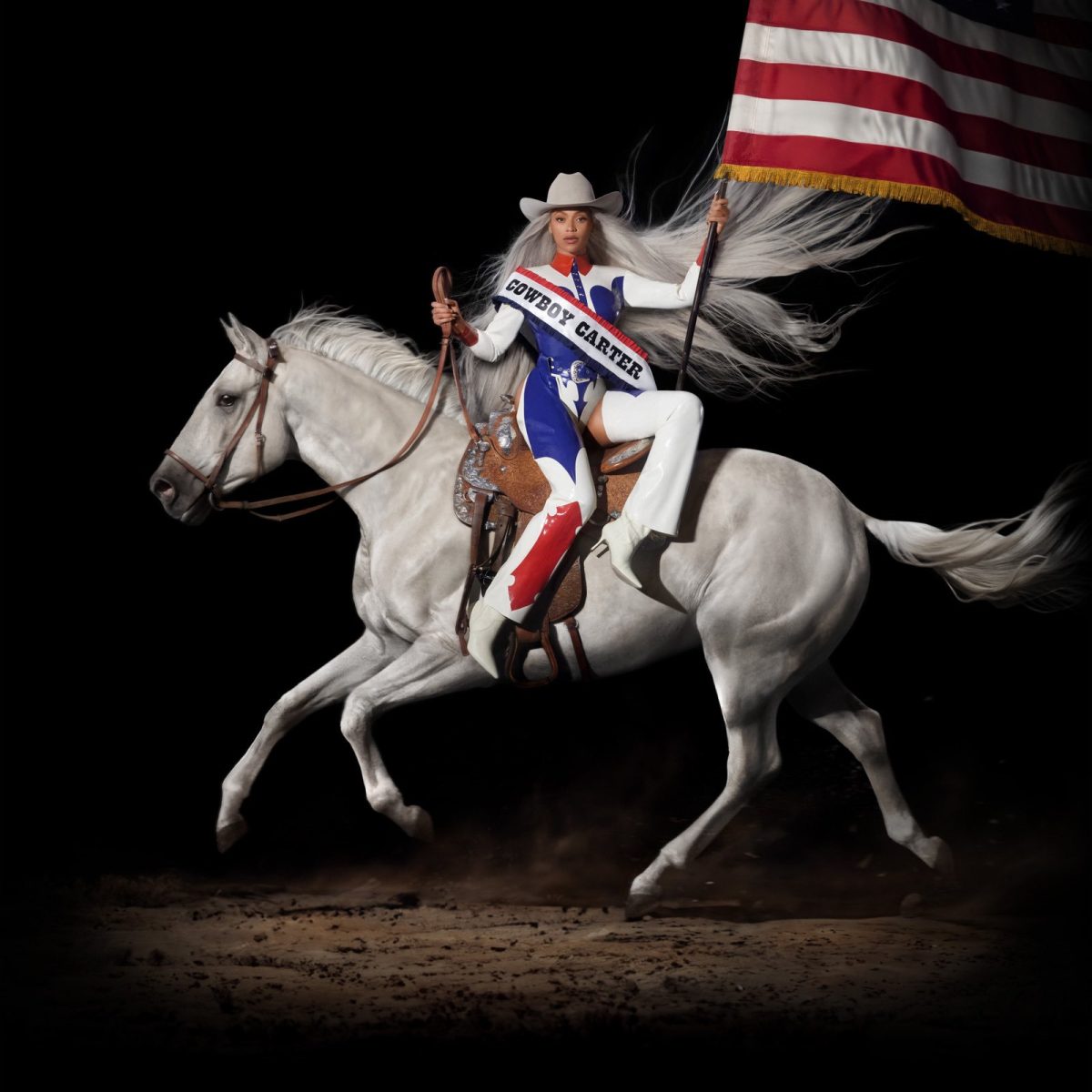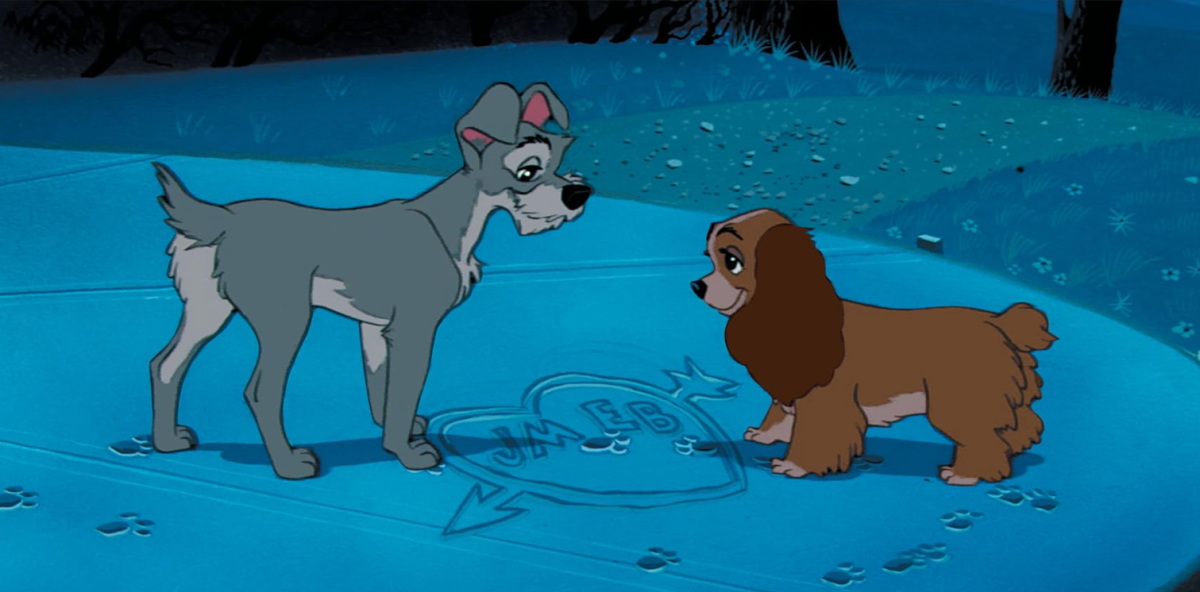Rating: 9/10
On Nov. 2, 2016, R&B supernova Beyoncé was met with hostility, beratement and blatant racism after performing the “Lemonade” track “Daddy Lessons” with The Chicks at the 50th Annual Country Music Awards in Nashville, Tennessee. Eight years later, the singer has officially clapped back at every deprecatory internet troll, reclaiming country music’s traditionally conservative landscape as one that is not only irrefutably her own but also exists in constant dialogue with Black America’s musical archive. Despite chronologically predating her seventh studio album “RENAISSANCE,” “Cowboy Carter” — released on Friday, March 29 — acts as a suspected follow-up to the singer’s 2022 opus.
Citing her 2016 performance with The Chicks as her ultimate inspiration for the album, Beyoncé has made it quite clear: she won’t tolerate thinly-veiled racism parading as patriotism.
“This album has been over five years in the making. It was born out of an experience that I had years ago where I did not feel welcomed … and it was very clear that I wasn’t,” Beyoncé said in an Instagram post. “But, because of that experience, I did a deeper dive into the history of country music and studied our rich musical archive.”
This post also highlighted the singer’s refusal to be limited by genre, with Beyonce telling audiences that “This ain’t a country album. This is a Beyoncé album. It’s more than a catchy slogan; anyone looking for mere honky-tonk cosplay is missing a much richer and more complex point.”
As “Queen Bey” so eloquently stated, the last time she stepped into country music’s scathing spotlight, she was not met with open arms. Between boos from the audience, accusations of being “un-American” and even a call to “get that Black bitch off stage,” her 2016 performance bore an eerie — and, this time, racially-motivated — resemblance to The Chicks’ very own bridge-burning show of 2003, where lead singer Natalie Maines publicly denounced then-president George W. Bush.
In the aftermath of Beyoncé’s unexpected duet with country music’s least favorite exes, the singer became the subject of a profusion of online hate.
“Why are you showing Beyoncé & the Dixie Chicks,” one commenter said in a post on Facebook. “One doesn’t believe in America & our police force while the other didn’t support our President & veterans during war.”
Others echoed this sentiment, sharing their opinion that “neither [Beyoncé nor The Chicks] are country” and that Beyoncé “isn’t even what country represents.”
In the unsubstantiated questioning of Beyoncé’s “country-ness,” a fascinating common denominator becomes clear. For it is unlikely listeners would question the validity of Beyoncé’s work if she performed an R&B, hip-hop or soul song at an all-encompassing award show like the Grammys or MTV Music Video Awards. However, by being a Black, predominantly R&B singer performing a country song at an award show for country music — alongside women who previously questioned the genre’s All-American branding — Beyoncé effectively stepped out of line.
Thank God for us that she did.
While the singer’s nods to her Southern roots and dialogue with the country music genre as a whole are present throughout the entirety of the album, they finds specific nuances in tracks “AMERIICAN REQUIEM,” “BLACKBIRD,” “SPAGHETTII” and “JUST FOR FUN.”
As the album’s opener, “AMERIICAN REQUIEM” utilizes a heavy gospel influence to interrogate the American identity, with Beyoncé singing, “Hello my old friend / You changed your name but not the ways you play pretend / American Requiem / Them big ideas, are buried here.”
In a stunning cover of the Beatles’ “Blackbird,” she pays tribute to history by bringing the ballad’s little-known background to light. While writer Paul McCartney has explicitly stated on multiple occasions that the song was inspired by the Little Rock Nine, a group of Black teens who were at the forefront of desegregating U.S public schools — with the “Blackbird” of the song representing a “Black girl” — Beyoncé’s take on this beloved fan favorite adds a level of depth and subtextual complexity to a song that the original rendition can only scratch the surface of.
“SPAGHETTII,” reminiscent of the unbridled passion of “Lemonade,” brings the album’s underlying investigation of genre front and center.
“Genres are a funny little concept, aren’t they?” singer Linda Martell says slyly in the song’s opening. “Yes they are. In theory, they have a simple definition that’s easy to understand. But in practice, well, some may feel confined.”
By featuring Martell — who is considered the first commercially successful Black female country artist — Beyoncé explores her present and acknowledges Martell’s past, recognizing that she wouldn’t be where she is today without artists like her.
One of the more thematically complex recountings of Beyoncé’s past experiences with the country music genre manifests itself in the form of “JUST FOR FUN,” a powerful duet with Black country artist Willie Jones. In the song’s chorus, Beyoncé tells listeners that “time heals everything” and she “doesn’t need anything,” making what appears to be a nod to the line “They say time heals everything / But I’m still waiting” in The Chicks’ “Not Ready To Make Nice.”
While Beyoncé’s “JUST FOR FUN” is a more solemn, subdued ballad than The Chicks’ angry country rock anthem, both tracks put forth a level of endurance and powerful self-acceptance that communicates resilience in an industry that hasn’t always been kind to them.
Ultimately, Beyoncé is not the first, nor the last artist to question the structural limitations genre can impose on a piece of work or performer as a whole. While discourse and debate surrounding what truly constitutes country music will most likely not cease anytime soon, projects like “Cowboy Carter” signal concrete steps in the journey towards achieving a more open and receptive attitude surrounding unadulterated artistic liberty.
This ain’t a country album, it’s a Beyoncé album: a project that transcends all sonic limitations and tired labels to produce something undeniably remarkable.
















